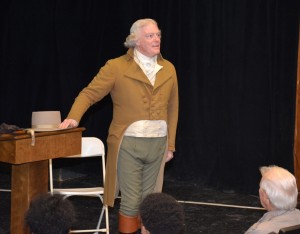Vance-Granville Community College students, faculty, staff and members of the community recently felt that they were in the presence of one of our nation’s Founding Fathers, when Bill Barker, in character as President Thomas Jefferson, presented the first in a series of three lectures. Barker has a local connection, as his father was an Oxford native and he has many relatives in Granville County.
The college’s Arts and Sciences division is offering a spring lecture series featuring Barker, the critically acclaimed resident “Mr. Jefferson” at Colonial Williamsburg, Va. The public is invited to attend the Jefferson presentations.
On Feb. 18, the series kicked off with “Mr. Jefferson and the Pursuit of Science.” Barker will return to present “Mr. Jefferson and the U.S. Constitution,” on Thursday, March 17, at 11 a.m. The final presentation will be “Mr. Jefferson and Slavery,” on Thursday, April 21, at 11 a.m. Each of these hour-long lectures are being held in the small auditorium in Building 2 on VGCC’s Main Campus in Henderson.
At his first engagement, the special guest was introduced by VGCC English department chair David Wyche, who noted that Barker is the same height, weight and general appearance as Mr. Jefferson. He has portrayed Thomas Jefferson in a variety of venues since his first appearance at Independence Hall in Philadelphia in 1984 and has conducted extensive research on Jefferson and his world. “Short of time travel, this is as close as we can come to meeting the man himself,” Wyche said.
“Jefferson” expressed his pleasure at visiting an educational institution like VGCC, noting that when he was growing up, education was only available to male children of families with means. “I hope for the day when everyone will have the opportunity to go to school, poor as well as wealthy, female as well as male, so that all will have a better opportunity to pursue ‘natural philosophy,’ what you now call ‘science,’” he said. Science, he added, is “founded upon open and free conversation, an open mind to pursue everything, to question everything, and thereby through objective reasoning to arrive at the discovery of facts.”
Barker, never breaking character, discussed the wide variety of scientific and technological advances that fascinated Jefferson. “What will happen in the next century, or two centuries?” he wondered. “Imagine! The greatest product this nation has to offer the world is imagination.” The president said that he still lived in a “four-mile-per hour world,” with both transportation and communication tied to the speed of horses, ships and “your own two feet.”
Jefferson said that he was frequently asked to name the greatest invention of this modern world, and his answer was “the printing press,” for its power to disseminate information and encourage literacy. “When you read for yourself, you begin to think for yourself,” he said. “You are no longer beholden to hearsay; you have the opportunity to read the facts distinctly for yourself, to put your mind to work, to ponder and to question, to objectively look at things.” He also touched upon fields like astronomy, agriculture, medicine, paleontology and even the science of government.
“What a bright future we have,” Barker said, from Jefferson’s perspective. “I enjoy much more the dreams of our future than I do the history of our past.”
For more information on the lecture series, call David Wyche at (252) 738-3364 or Deanna Stegall at (252) 738-3311.
